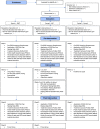Music therapy, neural processing, and craving reduction: an RCT protocol for a mixed methods feasibility study in a Community Substance Misuse Treatment Service
- PMID: 37245018
- PMCID: PMC10225077
- DOI: 10.1186/s13722-023-00385-y
Music therapy, neural processing, and craving reduction: an RCT protocol for a mixed methods feasibility study in a Community Substance Misuse Treatment Service
Abstract
Background: Music therapy has been shown to be effective for multiple clinical endpoints associated with substance use disorder such as craving reduction, emotion regulation, depression, and anxiety, but there are a lack of studies investigating those effects in UK Community Substance Misuse Treatment Services (CSMTSs). Furthermore, there is a demand for identifying music therapy mechanisms of change and related brain processes for substance use disorder treatment. The present study aims to evaluate the feasibility and acceptability of music therapy and a pre-test, post-test, and in-session measurement battery in a CSMTS.
Methods: Fifteen participants, from a community service based in London, will take part in a mixed-methods non-blind randomized-controlled trial. Ten participants will receive six-weekly sessions of music therapy in addition to the standard treatment offered by the CSMTS-five of them will receive individual music therapy and five of them will receive group music therapy-while a further five participants will act as a control group receiving standard treatment only. Satisfaction and acceptability will be evaluated in focus groups with service users and staff members following the final treatment session. Moreover, attendance and completion rates will be monitored throughout the intervention. Subjective and behavioral indexes will be assessed before and after the interventions to explore the effects of music therapy on craving, substance use, symptoms of depression and anxiety, inhibitory control, and will be correlated with associated neurophysiological signatures. In-session analysis of two individual music therapy sessions will serve to explore how music and emotion are processed in the brain within the therapy. The data collected at each step will be included in an intention-to-treat analysis basis.
Discussion: This study will provide a first report on the feasibility of music therapy as an intervention for participants with substance use disorder engaged within a community service. It will also provide valuable information regarding the implementation of a multifaceted methodology that includes neurophysiological, questionnaire-based, and behavioral assessments in this cohort. Notwithstanding the limitation of a small sample size, the present study will provide novel preliminary data regarding neurophysiological outcomes in participants with substance use disorder that received music therapy.
Trial registration: ClinicalTrails.gov, NCT0518061, Registered 6 January 2022, https://clinicaltrials.gov/ct2/show/NCT05180617.
Keywords: Community treatment service; EEG; Feasibility; Mental health; Mixed methods; Music therapy; Neural processing; Randomized controlled trial; Substance use disorder.
© 2023. The Author(s).
Conflict of interest statement
The authors declare that they have no competing interests.
Figures
References
-
- Global Burden of Disease Collaborative Network. Global Burden of Disease Collaborative Network. Global Burden of Disease Study 2019 (GBD 2019) Results. Seattle, United States: Institute for Health Metrics and Evaluation (IHME). 2019.
-
- Public Health England – GOV.UK 2020. https://www.gov.uk/government/statistics/substance-misuse-treatment-for-.... 2020.
-
- Public Health England – GOV.UK 2021. https://www.gov.uk/government/statistics/substance-misuse-treatment-for-.... 2021.


